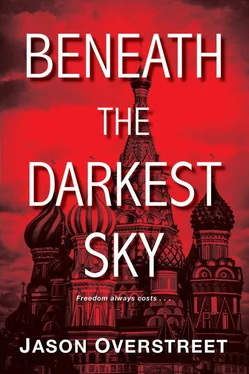Magadan, Russia
January 1938
TIME DOES NOT PASS FAST WHEN ONE IS WORKING IN THE SOVIET prison camps. It had been exactly one week since Yury and Boris had left the camp here at Magadan and headed up the dreaded Road of Bones, but it had felt like two months. If they had managed to stay alive so far while navigating the frozen tundra, they would now be fighting against forty to fifty below temps.
My standing with my boss, Koskinen, had not deteriorated at all. In fact, I was on even better terms with him. The problem that existed in these ungodly camps was that a man like him couldn’t actually help me. He was beholden to a slew of individuals who outranked him, and many of them seemed to disappear and be replaced often. It was a revolving door of bureaucratic Stalin worshippers who made up the Dalstroi, many of them willing to cut one another’s necks in order to lay claim to the latest idea of where the newest gold mine might be.
The only thing keeping Koskinen around, it seemed, was his unprecedented knowledge of land and structural development. He was a brilliant engineer and architect, able to design the most comprehensive drawings, most of which were too advanced to use, as they required materials that were not yet being shipped up the coast. His knowledge of state-of-the-art sewage systems, electrical grids, etcetera, was not being completely put to use.
All of the engineers met with Koskinen on Sundays as a group, but it was my biweekly one-on-one meeting with him that kept alive my hopes of one day seeing my wife and daughter again. It was a Saturday in late January when I decided to press the issue further. But first I had to carry a toilet bucket to the big hole.
All of the barracks had five eighteen-inch-high buckets called parasha to use as toilets, all set aside in a small room where we were forced to relieve ourselves in front of one another. We used dried leaves from the taiga to wipe—poplar, aspen, or birch. Whichever zek topped a bucket off had to carry it to the big hole. Failing to do so would cause a fight. Guards typically let us carry them to the five-by-five, ten-foot-deep hole unaccompanied, but they made sure the bucket was full first.
The big hole was covered by a six-inch-high, square wooden lid, which looked like the roof of a small shed. The lid had handles on each side and a hinge in the middle, allowing one to open it on the right or left. There were many of these zek -dug holes within the camp containing waste and leaves. Once a hole was full, it was sealed by covering the lid with a mound of dirt. The hole was then left this way for one year, after which the contents would be used as manure at the nearby Dukcha State Farm, where they were still foolishly trying to grow vegetables in an impossible climate. They were also trying to acclimatize goats, sheep, cattle, rams, ducks, and chickens there, with very little success.
Finished with my toilet duty, I stood in front of the commander’s barracks and looked down at my concrete-covered felt boots and galoshes. Still had them, even though they’d already issued me clothing for the still-distant summer, including gray canvas shoes. For the summer they had also issued us long gray underwear, top and bottom, made of linen and old, frazzled, cotton military tunics.
I kicked the lower step of the commander’s deck until the almost-dry concrete began to flake off. I took a piece of torn-away sock from my pants pocket and wiped the sawdust and concrete splatters from my face. At least there were no mosquitos to flick away yet. I’d been told they loved the muddy roads and alleys throughout the camp when the summer came, or perhaps it was the filthy sewage holes, the dirty and sick bodies, or the smelly clothes of new arrivals who’d likely be issued garments recycled from the dead.
The small amount of cold water we were given to wash our clothes periodically had little effect. And clothes were never thrown away. They might as well have been gold, too, as far as the Dalstroi heads were concerned. Zeks would kill one another over them. We’d seen such things when men awoke to find their coats or shoes stolen.
Water was like gold, too. And it was served randomly in a bucket from which we dipped. We weren’t given bowls or cups. We’d been issued a piece of tin to make a pot, usually no more than twenty-four ounces’ worth. From this we drank and ate. We’d been given no utensils, as our hands would serve as such. Stalin had more important uses for tin.
If a zek ’s pot was stolen, he’d have to find another willing to share, a rarity, as each man was only allowed to fill his pot with soup, gruel, or water one time per serving. A stolen or lost pot essentially meant having to cup your hands and have the cooks ladle the food into them. Such zeks quickly learned how to overlap their hands to keep liquid from seeping through the natural openings that most bony, knobby hands created. On the rare occasion when the soup or gruel was actually boiling hot, this meant not eating. It always meant not being able to have the nightly ration of hot water for dinner. I felt awful for these poor souls, for I hadn’t yet seen a zek lose a pot and be reissued another.
But even with self-made pots in hand, water rations were inconsistent. Not counting the ladle portion of hot water we were given for dinner, the most we ever received in a day was a potful. To make matters worse, only sporadically were we sent to the baths with a bucket for ten of us to share. Using our same twenty-four-ounce pots, we dipped from the bucket and washed ourselves. No soap was provided.
All of these barbaric norms still haunted me, as I remained standing in front of the commander’s small barracks. With most of the concrete removed from my boots and face now, I stepped onto the deck and entered.
“I can see that you Americans are always on time,” he said from behind his desk, a lit cigar in hand. “Please sit.”
“Yes, Commander Koskinen.”
“I do not know how much longer I’ll be here,” he said. “I may be going to the mines to construct new camps. They’ve found many new mines. Maybe you can come. With your boy! It is warm inside the mines.”
“As you wish, Commander Koskinen,” I said, gladly breathing in the sweet-smelling cigar smoke.
“Do you know about explosives?”
“Yes,” I said.
“Good. But you would be building still. Only, it might serve you well someday in the camps, knowing about explosives.” He paused before continuing. “There has been no record to be found regarding your sentence reduction. But I have ordered a new one for you based on superior work. I filed the document and it will be sent to the proper authorities. It’s for your boy, too.”
“Thank you.”
I felt a warmth run through my body, a good feeling I hadn’t felt in a year. I continued breathing in the smoke, actually getting a chemical effect from it, as I hadn’t breathed in tobacco smoke to this degree for such a long time.
“Do you have any free relatives here in the Soviet Union?” he said, flicking some ash into a tin cup. “If you do, ask them to send some money so you can buy tobacco once in a while from the commissary like the other zeks do, at least the ones whose families have money.”
“I do not smoke,” I said, “but I have written a letter to a close comrade. I wrote it last week.”
“You wrote ‘Prisoner Prescott Sweet’ and ‘Sevvostlag Magadan Camp’ as your name and address, as required, yes?”
“Yes,” I said.
“Is he an American?”
“Yes.”
“Is he here in the Soviet Union?”
“No, he was earlier. He’s now in Argentina.”
“Then NKVD confiscated the letter. No letters from prisoners are allowed to leave the Soviet Union right now. As soon as they saw the Sevvostlag in the upper left corner and the Argentina address below, they tore it up. Only letters from free civilians can go outside Soviet borders, this after NKVD has read them. Maybe your comrade is a spy, you see?”
Читать дальше











